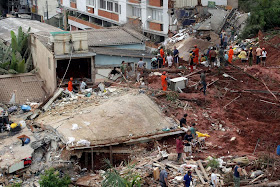But before you conclude that rain is entirely inoffensive, peruse the pictures below.
Our rain comes in the form of torrential downpours – as much as a foot of it in twenty-four hours.
In the hills above Rio de Janeiro, a series of slides began at about 3 AM last Wednesday morning, catching people in their beds and sweeping them away.
One victim, a baby just two months old, was washed away in his crib. His body has yet to be found. One woman feared she’d lost up to fifteen family members, including five nieces and nephews.
In all, more than 600 people perished.
The story repeats itself, year after year, during the rainy season.
How many die?
Nobody knows.
Here’s why: Landslides seldom bring down wealthy communities. Landslides almost always bring down shantytowns. (favelas). Those shantytowns are constructed on land too poor, or inaccessible, for anyone with a modicum of money in the bank to be interested in. And the occupation of that land is technically illegal and always unregistered. When the whole community slides down the hill some of the bodies are recovered. Others often disappear beneath the rubble – and stay there.
The worst, this year, may be yet to come.
In 2010, in many parts of this country, it rained, almost constantly, from the beginning of March until mid-April.
Here, on Bumba Hill, just across the Niteroi bridge from Rio de Janeiro, a favela was built on what had been a garbage dump up until the late 1970’s. Experts had warned, time and again, that it was going to plunge down the hillside one day. But people built anyway. The municipality did nothing.
And then the rains came.
More than two hundred died.
Some continue to lie in permanent graves among the still-rotting garbage.
In Angra dos Reis, on the other side of Rio, the disaster was similar, but on a much smaller scale. Estimates of deaths don’t exceed forty.
More than two hundred died.
Some continue to lie in permanent graves among the still-rotting garbage.
In Angra dos Reis, on the other side of Rio, the disaster was similar, but on a much smaller scale. Estimates of deaths don’t exceed forty.
Forty.
About the same number of people who died during the recent floods in Australia.
But here's the rub: There, they got more than two meters of rain. We only got about a meter and forty centimeters of it.
Lots less rain, more than 15 times as many fatalities.
Depressing?
You bet.
Unavoidable?
Certainly not.
Is the government going to do anything about it anytime soon?
Unlikely.
This is Brazil.
And, at times like these, it breaks my heart.
Leighton - Monday










Great article, Leighton
ReplyDeleteGreat albeit distressing pictures.
The residents of the favelas -- are they as a rule registered as Brazil nationals?
I'm thinking of the Roma population in the Balkans. They tend to stick to their own traditions and rarely register anything - births, marriages, deaths. Legally, they don't exist. On the whole, that suits them fine. They can reinvent themselves at will and as needed. Or, could before the international DNA and fingerprint database was set up. But, it also works against them in any vigilante pogroms against them. A person who doesn't exist can't be murdered or harmed.
Basically, what I'm asking is, apart from human rights under the UN Convention, are they legal entities and do they have any rights?
Seeing these images on the news and trying to imagine the devastation to lives and communities is appalling. It makes it worse that the people from whom so much is being taken had so little to start with.
ReplyDeleteHow sad, Leighton. Thank you for the sensitive and heart-wrenching post.
ReplyDeleteAmazing and awful images. Leighton your posts are always an education.
ReplyDeleteLeighton, the pictures are graphic and heartbreaking.
ReplyDeleteStay safe.
Hi Mira,
ReplyDeleteOh, yes, they're registered.
Everyone in this country is required to carry a national identity card.
And a "work card", which is actually a little booklet with their working record.
And a voter registration card. (Voting is not voluntary, it's mandatory, and you get fined if you don't do it.)
So all of those poor folks are, indeed, legal entities.
Bill,
ReplyDeleteYes, that's the saddest part of it all.
Jaden, Shane and Susan,
Thanks for reading and commenting.
It's nice to know I'm not just talking to myself.
Good morning, Leighton
ReplyDeleteI've had a look at the political system. In theory, someone should be fighting for their votes. In practice, am I right in thinking that those who do don't also get into office?
But, be that as it may, someone should be held culpable for all those preventable deaths.
Horrifying. And Haiti is still in an appalling mess from the earthquake. However badly governed Brazil is, I think Haiti's worse--they barely have a government.
ReplyDeleteMira,
ReplyDeleteActually, no.
The last President of Brazil, a man who served for eight years, and left office on the 31st of December with an 86% approval rating is an ex labor leader with a fifth grade education.
The underprivileged do get elected in Brazil and even, I would venture to say, to an extent that would probably be impossible in most western societies (except for local candidates in inner cities.)
But the rest of the story is too complex to get into here. Sometime, when I'm not pushing a deadline, I'll write to you directly on the issue.
Carola,
You are SO right. Haiti is worse on every count. 316,000 dead at last count. Appalling!
No doubt, it will worsen, sadder still. Disease. http://www.cnn.com/2011/WORLD/americas/01/16/brazil.flooding/index.html?eref=rss_topstories&utm_source=feedburner&utm_medium=feed&utm_campaign=Feed:+rss/cnn_topstories+(RSS:+Top+Stories)
ReplyDeleteSo sorry, Leighton. Thanks for sharing.
Thanks, Ben, for adding the video link.
ReplyDeleteSee you after the deadline, Leighton.
ReplyDelete